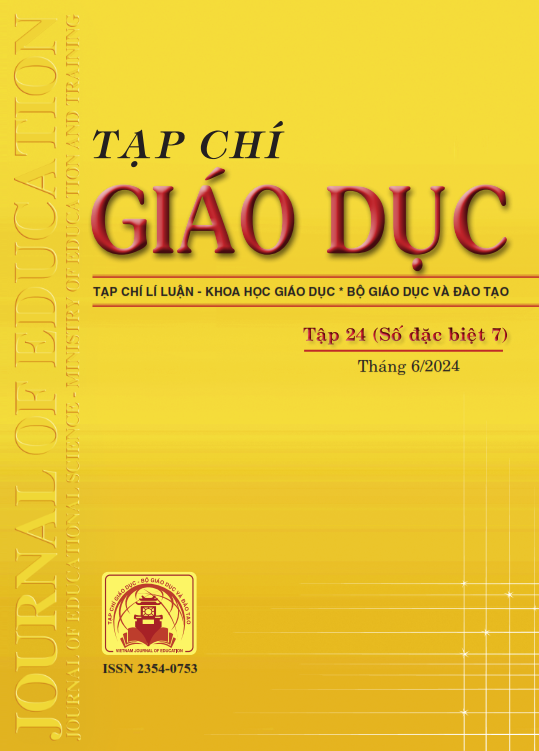Sử dụng TikTok để cải thiện kĩ năng nói tiếng Anh cho học sinh lớp 10: Một nghiên cứu hành động
Tóm tắt
Effective communication is crucial for success in today's interconnected world. As English has solidified its position as a lingua franca, proficiency in this language is increasingly vital for navigating diverse facets of life, from educational and professional domains to personal interactions and cultural exchange. Among core English skills, speaking stands out as a key competence enabling clear self-expression, meaningful dialogue, and robust interpersonal relationships. This classroom action research investigated the use of the social media platform TikTok to enhance 10th-grade students' English speaking skills at a high school in Hanoi, Vietnam. Data collection instruments included questionnaires, pre-tests, and post-tests, with t-test analysis showing the implementation of TikTok was effective, improving mean scores from 5.39 on the pre-test to 6.75 after cycle 1 and 7.90 after cycle 2, indicating TikTok created a more conducive learning environment for developing students' speaking abilities. These findings underscore the potential of innovative digital tools in fostering English language proficiency and suggest implications to integrate technology in language education to better prepare students for communication in diverse real-world contexts.
Tài liệu tham khảo
Bhalla, R., Tiwari, P., Chowdhary, N. (2021). Digital Natives Leading the World: Paragons and Values of Generation Z. In: Stylos, N., Rahimi, R., Okumus, B., Williams, S. (eds.) Generation Z Marketing and Management in Tourism and Hospitality. Palgrave Macmillan, Cham. https://doi.org/10.1007/978-3-030-70695-1_1
Crystal, D. (2012). English as a Global Language. Second Edition (Canto classics). Cambridge University Press. Ferstephanie, J., & Pratiwi, T. L. (2022). The Effect of TikTok Platform to Develop Students’ Motivation in Speaking Ability: A Classroom Action Research. Wiralodra English Journal (WEJ), 6(1), 1-12. https://doi.org/10.31943/ wej.v6i1.147
Harmer, J. (2007). The Practice of English Language Teaching. Harlow: Pearson Longman. Herlisya, D., & Wiratno, P. (2022). Having Good Speaking English through TikTok Application. Journal Corner of Education, Linguistics, and Literature, 1(3), 191-198. https://doi.org/10.54012/jcell.v1i3.35
Hopkins, D. (1993). A Teacher’s Guide to Classroom Research. Open University Press. Hornby, A. S. (2000). Oxford Advanced Learners’ Dictionary of Current English (6th Ed.). Oxford University Press. Leong, L. M., & Ahmadi, S. M. (2017). An Analysis of Factors Influencing Learners’ English Speaking Skill. nternational Journal of Research in English Education, 2(1), 34-41.
Mandasari, M., Kossassy, S. O., & Jufri, Y. (2022). Incorporating of Social Media in Distance Learning: A Case Study on How TikTok Improve Speaking Skill Among ESP Students. The 2nd International Conference on Government Education Management and Tourism, Bandung City, Indonesia.
Nguyễn Thị Hồng Nhật, Đỗ Thị Thanh Dung, Lưu Thị Hương, Nguyễn Thị Minh Phương, Trần Thị Minh Phương, Mai Thị Vân Anh (2023). Thực tiễn triển khai Chương trình giáo dục phổ thông 2018 môn Tiếng Anh: Góc nhìn từ giáo viên thực hiện chương trình. Tạp chí Giáo dục, 23(5), 58-63.
Nguyen, H. H. (2021). Using TikTok to improve speaking performance at an Academy of Journalism and Communication EFL class. The 9th Open TESOL International Conference 2021.
Nguyen, T. H. N. (2019). Teachers’ implementation of computer-assisted language learning in the context of educational change in Vietnam. In V. C. Le, H. T. M. Nguyen, T. T. M. Nguyen & R. Barnard (Eds.), Building teacher capacity in English language teaching in Vietnam (pp. 133-149). New York, NY: Routledge.
Rao, P. S. (2019). The Importance of Speaking Skills in English Classrooms. Alford Council of International English & Literature Journal. Syakur (1999). Language Testing and Evaluation. Surakarta: UNS Press.
Thornton, M., & Reinders, H. (2019). Blended learning in English Language Teaching. Cambridge University Press.
Đã Xuất bản
Cách trích dẫn
Số
Chuyên mục
Giấy phép

Tác phẩm này được cấp phép theo Ghi nhận tác giả của Creative Commons Giấy phép quốc tế 4.0 .












